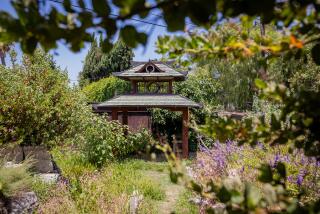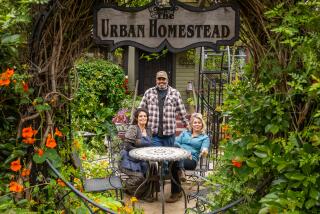Family Heirlooms
- Share via
Round, ripe and ruby-red, the ‘Goosecreek’ tomato rolls across Jimmy Williams’ palm like a family jewel--which, in a way, it is. His great-great grandmother, a Caribbean slave, had its seeds in her pocket when her ship docked in Goose Creek, S. Carolina, near Charleston. There, in the early 1800s, she planted her smuggled tomatoes, saved more seeds and saw that they were handed down to future generations. They reached Williams during the 1960s via his grandmother Elouise, who taught him to make germination trays from cast-off dresser drawers, dividing them into small compartments and choosing the best seedlings to grow into plants.
Over the years--moving from Long Island, where he grew up, to New York City, where he designed sportswear, to L.A., where he married, had children and got back to his gardening roots--Williams kept some ‘Goosecreek’ seeds, finally planting them behind the Hancock Park house that he and his former wife, Annette Elmo, bought in 1989. Before long, the thrill of working the earth, which he had discovered at age 9, seized him again, and he was breaking up concrete, hauling horse manure and building beds for tree-collard greens, Brussels sprouts and, of course, tomatoes.
And wouldn’t you know, as he developed a compost tea to feed his plants and expanded the mix of heirloom seeds he acquired from other grower-collectors, that neighbors and friends were soon clamoring for his exotic striped zucchini, rainbow peppers and Sequoia purple beans. One New York friend, Sandy Head, suggested he start a business and offered to help compile his catalog. In 1999, the first HayGround Organic Gardening list appeared, offering mail-order seedlings of rare and heirloom edibles.
Why seedlings and not seeds, which are faster to produce and far easier to ship?
This question must have plagued Williams during his first two years, when, desperate for germination space, he tended thousands of seedlings on the roof of his garage. Even now, still using that roof, but with commercial growers in Sun Valley and Camarillo to help fill orders, his response is still the same: “The Number One garden failure is the failure of seeds to sprout. And if you start with plants, you can cut growing time by a month or more.”
To hear him talk, it’s clear that Williams regards coaxing people to raise food as part of his personal and professional mission. “Something happens when you plant, tend, harvest and consume your own food,” he says. “Eighty years ago in this country, this was common. Seeds passed from neighbor to neighbor. It’s time we got back to that.”
Heirloom selections, those preserved for their superior taste, looks and growing vigor, Williams says, often far outshine those sold in stores, which are prized for shelf life and durability during shipping. And, of course, heirlooms are charming novelties. As Williams put it, “Why buy what you can grow?”
His clients, who live all around the U.S. and range from patio hobbyists to small farmers, agree. Since 1999, his sales have quadrupled, and he has even begun designing gardens for those with limited time or expertise to weave plants into landscapes.
He tests what he sells and practices what he preaches in his own garden, which is little more than a 20-by-20-foot arrangement of raised beds stuffed to the gills with leafy wonders. Here tomatoes crawl up wires against a sunny wall, zucchini snakes along the ground and eggplants swell like balloons under the bleached gaze of Rufus, a tattered scarecrow. “I’m constantly changing things,” Williams says. “Rotating crops, trying different selections, seeing what works.”
One winning combination is his “compost tea,” garden waste steeped with water in a bucket and then strained, the liquid sprayed on leaves to boost growth and repel bugs. Also good is top-dressing the soil with compost, which adds micronutrients and draws aerating, earth-enriching worms. “In the tightest spaces, you can raise huge amounts of food, if you do it right,” Williams observes, adding that children (particularly his own: Porter, 14, and Logan, 16) are well-disposed toward vegetables grown in their own backyard.
This includes the ‘Goosecreek’ tomato. Some day, Williams knows it will be time to pass it on.






